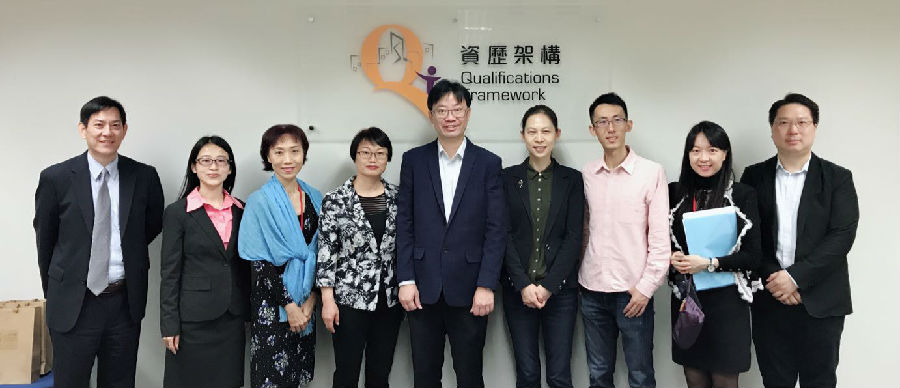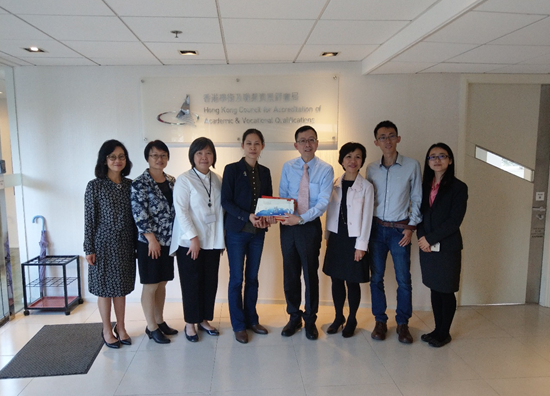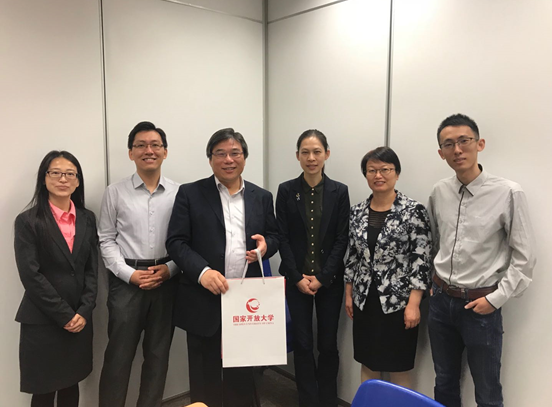 In order to better complete the "National Credit Bank and Qualifications Framework Construction” project of the Planning Department of the Ministry of Education, at the invitation of the Qualifications Framework (QF) Secretariat of Hong Kong, a delegation composed of four people including Chen Jie from the Finance Department of the Open University of China (OUC),
In order to better complete the "National Credit Bank and Qualifications Framework Construction” project of the Planning Department of the Ministry of Education, at the invitation of the Qualifications Framework (QF) Secretariat of Hong Kong, a delegation composed of four people including Chen Jie from the Finance Department of the Open University of China (OUC),
Bao Yili from the Academic Affairs Department, and Gao Jie and Li Jing from the Credit Bank (Learning Accreditation Centre) visited Hong Kong QF Secretariat, the Hong Kong Council for Accreditation of Academic & Vocational Qualifications (CAAVQ), the Open University of Hong Kong (OUHK), and Hong Kong University (HKU), in order to investigate the latest progress and implementation experience, quality assurance mechanisms, course evaluation standards, college and university credit recognition policy, and related fee policies.

The delegation interviewed the Hong Kong QF Secretariat on the new version of the Qualifications Framework and its Generic Level Descriptors in 2018. The delegation consulted with colleagues from the Secretariat on the meaning and extension of the generic level descriptors with the aim of providing a reference for the refinement of the generic level descriptors of the National Qualifications Framework. At the same time, in view of the exploration of the OUC in developing non-degree education, industry colleges, and the practices of the credit bank in the development of the modules for accreditation of learning achievements oriented to the needs of talents in industries, members of the delegation, colleagues from the Secretariat, and a professional writer of logistics, Dr. Lun Wanxia, discussed the writing of the competency module.

Group photo of the Members of the Delegation with Mr. Steve Lai, general manager and other personnel of the QF Secretariat
The quality assurance system is an essential part of the implementation of the qualifications framework. Since the CAAVQ undertakes the evaluation of academic and professional courses offered by colleges, universities, and institutions that do not have self-accreditation qualifications, the delegation visited in order to research the four stages of quality assurance procedures under the qualifications framework of CAAVQ, curriculum evaluation-related accreditation criteria, the admission policy for senior students, international recognition and cooperation of the CAAVQ as a third-party independent accreditation body, and the CAAVQ’s governance model. They also discussed the possibility of strengthening exchanges and training in the future with their CAAVQ colleagues.

Group photo of the delegation with Mr. Albert Chow, executive director (fourth from right), Dr. Sandra Wong, deputy executive director (third from right), Dr. Christina Ng, head and senior registrar (vocational and professional accreditation) (first from left), and Ms. Cindy Chan, head of executive support and engagement (third from left).
One of the ultimate application scenarios of the curriculum approved by the qualifications framework is credit recognition in colleges, universities, and institutions of higher learning. The OUHK is an institutions that offers courses in accordance with the qualifications framework and implements credit recognition. The delegation had a meeting with OUHK representatives on its "Guidelines for Credit Recognition Applications" policy and the "Credit Recognition Arrangements between the Open University of Hong Kong and the Hong Kong Police Academy” project, which provided a more complete and profound understanding of the application of the qualification structure.
Group photo of the delegation with Dr. Li Kam Cheong, director of the Research Office (third from left) and Dr. Billy Wong Tak Ming, research coordinator (second from left).
The delegation also visited HKU and held a discussion with Professor Wang Xiaoqi from the Department of Politics and Public Administration about the situation and contributions of the OUC in the provision of degree, non-degree, and continuing education and the construction of a learning society for individual learners.
By Li Jing, OUC